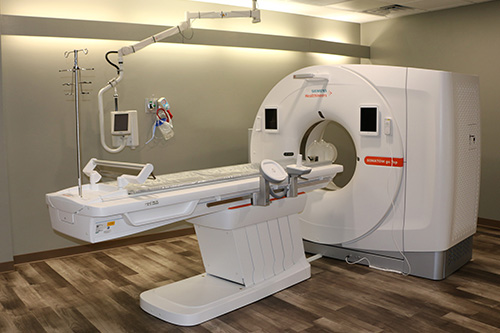New, faster imaging services for patients
Thanks to funding from the Bothwell Foundation, Bothwell Regional Health Center’s hospital CT scanner has been replaced, and the Oncology department scanner in the Susan O’Brien Fischer Cancer Center has been upgraded. The improvements provide faster and more accurate information for diagnosing and treating patients’ illnesses and injuries.
In 2022, the foundation awarded over $1.2 million to Bothwell for equipment and projects, which included nearly $800,000 for the two CT scanner projects.
Bothwell Foundation Executive Director Lauren Thiel-Payne said the board determined the projects to be vitally important for providing advanced imaging care for patients.
“Projects like these are why the foundation exists,” she said. “This was a large capital expense that wasn’t planned for in the hospital’s budget. The foundation was happy to fill the gap and help make the improvements possible sooner rather than later.”
CT (Computed Tomography) scanners are one of health care’s most used imaging tools for diagnosing injury and illness as well as for performing procedures such as biopsies and other invasive exams. It uses a combination of x-rays and computer technology that produces specialized images that can be viewed in different planes, including in three dimension.
Marc Dougherty, Bothwell’s Medical Imaging director, said a CT scanner has the ability to show detailed images of the body including bones, muscles, fat, organs and blood vessels.
“A CT scan is often the best method for revealing internal injuries, bone fractures, strokes and bleeding, and detecting many different cancers,” he said. “And it’s fast, painless and accurate.”
The hospital’s new scanner is a state-of-the-art Siemens 128-slice configuration that replaces the existing 64-slice scanner purchased in 2010. Dougherty said the new scanner has improved image quality and allows his team to acquire images faster, which reduces overall exam times.
“The improved image quality we have with the new scanner means even more accurate diagnoses as well as a decrease in radiation dose to the patient,” he said. “We also get greater body coverage, which means patients don’t wait as long.”
The hospital’s scanner is used 24 hours a day and 365 days a year, and about 1,200 diagnostic scans are performed each month. With new remote technology, the technologist and physician are able to spend more time in the room at the patient’s side, which can help improve communication and patient satisfaction.

Dougherty said the new machine also includes several software packages for cardiac, lung and neurologic imaging that allow his team to perform new exams.
“The cardiac package allows us to now image the heart and coronary arteries, and the lung package is used for low-dose lung cancer screening,” he said. “The really exciting addition is the neurologic pack for brain perfusion studies. This is extremely beneficial to our stroke program and allows physicians to make diagnoses and patient treatment plans faster.”
The Oncology department’s CT scanner was also manufactured in 2010 and would have timed out of service this December before its recent update. The scanner is primarily used for patients who receive radiation therapy to treat their cancer. The radiation oncology team plans treatments for the area or areas requiring radiation and calculates the doses each part of the body will receive with precise detail.
Kara Sheeley, Oncology Services director, said that with the upgrade, the scanner can now be serviced until 2032.
“While the CT scanner worked perfectly for the Radiation Oncology team, it needed software and computer systems updates to bring the technology up to current service and cyber security recommendations,” she said. “Along with the software upgrade, the scanner increased from a 16-slice to 32-slice image receptor, meaning faster scans for patients.”
In addition to serving cancer patients, the Oncology CT scanner is a backup to the hospital scanner during downtime or planned maintenance. Sheeley said another upgrade has made the oncology scanner even more reliable.
“The final improvement to our scanner was the addition of a power injector to the room where the scanner resides,” she said. “Having a power injector means when the hospital’s scanner is backed up or down, this machine is available and ideally we’re never without an operable CT scanner for patient care.”
Dougherty and Sheeley agreed on their gratitude for the foundation’s support that allowed the projects to happen this year.
“What a blessing the foundation is to the hospital, our departments and our clinics,” Sheeley said. “Their board believes in the long-term health and vitality of Bothwell, and this funding shows it.”
